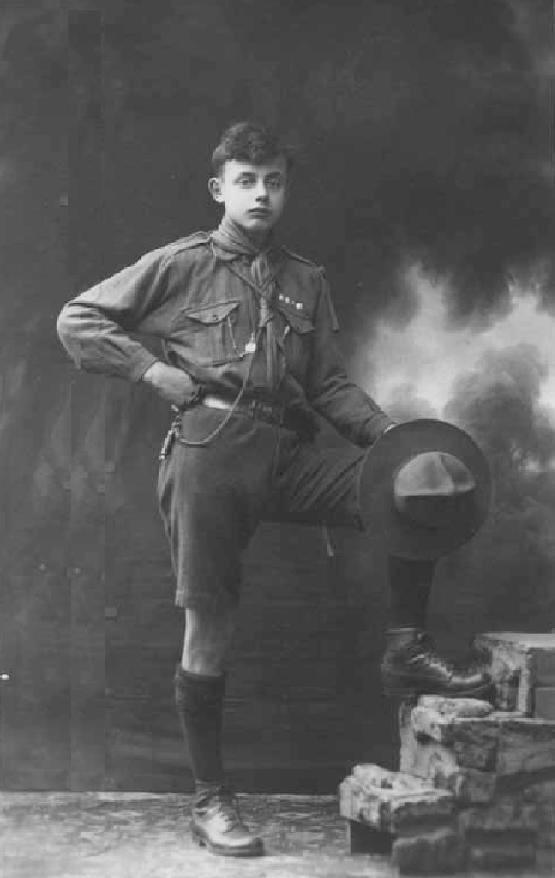
Figure 1.--This portrait is unidebtified. We believe that he was a Belgian Scout, and the portrait was probably taken during the 1920s. |

|
We have no information on early Belgian Scouting, but assume groups began to form at about the same time as in France. I have no information on how Belgian Scouting fared during World War I (1914-18). The Germans occupied almost all of the country for most of the War. I believe the Scouts were the most popular boys' youth group during the inter-war years and that there were several different associations, but have little information at this time. Germans in Belgium, especially Flanders organized Hitler Youtyh units. Right and left wing parties attemoted to organize youth units, but they had trouble competing wuth Scouting. The Germans had occupied almost all of Belgium during World War I. The Belgian Government at the onset of the German invasion in 1940 decided to send children to saftey in France. The comapse of the French Army, howeverm meant that Belgium was completely overrun and occupied. The German authorities in Belgium never conceived of a consisent policy toward Scouting. After arresting many Scout masters they then attempted to win Scouts over. Eventually theybtried to supress the movement. Ths proved difficult and the conduct of Belgian Scouts during the occupation is a proud heritage. have no information available yet on Belgian Scoting developments in the post-war era.
We have no information on early Belgian Scouting, but assume groups began to form at about the same time as in France. I have no information on how Belgian Scouting fared during World War I (1914-18). The Germans launched World War I by invading neutral Belfium (August 1914). The Germans Army suceeded in occuping almost all of the country in the first month of the War. The British rushed the British Expeditionary Force (BEF) to France and Belgium. The Belgian Army with Allied support held out in a small southwest corner of the country. I am not sure if the Germans in the occupied area permitted Scouting to continue. The liberation of Belgium began with the Allied 100 Days Campaign (August-November 1918).
Scouting grew in popularity during the inter-War period. It became a respected national institution. Belgian parents began to see it as a positive influence on their boys. We believe the Scouts were the most popular boys' youth group during the inter-war years and that there were several different associations, but have little information at this time. Germans in Belgium, especially Flanders organized Hitler Youtyh units. Right and left wing parties attemoted to organize youth units, but theu had trouble competing wuth Scouting.
Belgium as in World War I attempted to remain neutral in World War II. And again as in World war I, the Germans invaded. Some Scouts attempted to reach saftey and avoid the German occupation by fleeing south to France. Only this time the Allies were unable to stop the Germans. King Leopold with the Belgian Arny was forced to surrender and shockingly France also fell to the Germans. The Belgian Scouts who had reached France were ordered home. The Germans persued a varying policy toward the Scouts. The occupation authorities banned SCouting and arrested some Scout leaders (1940), but relented in 1941. We are not sure just why. We susoect it was in part due to the fact that the occupation in Belgium wa conducted by the military. The Germans banned Scoyting agian as the war situation worsened for them (1943). Despite the ban, many Belgian Scours were able to cointinue small-group activities as long as they were conducted descretely and without uniforms. In addition to the German authorities, Belgian Scouts aldo had to deal with the collborationists and their youth groups. The Scouts participated in many humanitarian efforts during the war. The most notable was summer camps for malnourished and sick children. Many were the children of Belgian POWs held in Germany and thus unavle to support their families. Scouts also participated in a range of Resistance activities. Few Belgian institutions survived the War as well as the Scouts. No only did their membership grow, but unlike many other Belgian institutions, there wa not hint of collaboration.
I have no information available yet on Belgian Scoting developments in the post-war era.
Navigate the Historic Boys' Uniform Chronology Pages:
[Return to the Main chronologies page]
[The 1900s]
[The 1910s]
[The 1920s]
[The 1930s]
[The 1940s]
[The 1950s]
[The 1960s]
[The 1970s]
[The 1980s]
[The 1990s]
[The 2000s]
Navigate the Historic Boys' Uniform Web Site:
[Activities]
[Biographies]
[Chronologies]
[Countries]
[Essays]
[Garments]
[Organizations]
[Religion]
[Other]
[Introduction]
[Bibliographies]
[Contributions]
[FAQs]
[Questions]
[Unknown images]
[Boys' Uniform Home]
Navigate the Historic Boys' Uniform Web organizatiion pages:
[Return to the Main Belgian Scout page]
[Boys' Brigade]
[Camp Fire]
[Hitler Youth]
[National]
[Pioneers]
[Royal Rangers]
[Scout]
